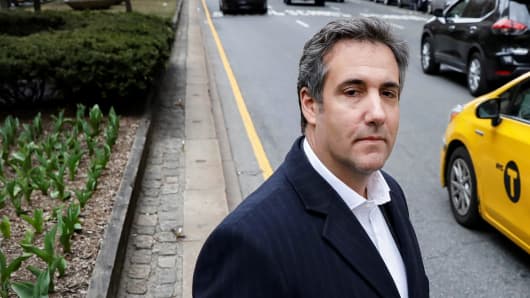Prosecutors weigh credibility and truthfulness by consistent statements. Mr. Trump fails this simple litmus test. He's made more contortions and twists on this than a professional wrestler.
Giuliani's entry into this fray appears to mark a new tactic by the administration to somehow find an exit ramp from this messy case. In other words, Giuliani is trying to tie together from new cloth a fresh legal theory to somehow argue the money was eventually funded by Mr. Trump so everything is ok.
In fact, this is a new construct that could backfire, especially if the Cohen documents seized in the raid tell a different story.
Of course, Mr. Trump could have avoided the mess if he and Cohen simply treated this deal with Daniels in a straight and simple manner from the start, rather than hiding behind convoluted anonymous names and missteps to conceal the deal.
This change of narrative was intended to cool things down, but it will probably end up turning up the heat in an already volatile case that, at the core, points to potential felonies and pressure on Cohen to cooperate in a case against his famous client.
Further complicating matters, on Thursday, it was revealed that the FBI had wiretapped Cohen and intercepted at least one call with the White House. The Feds can only obtain a wiretap if they are able to present information to a federal judge, in this case the judge presiding in Manhattan, sufficient to demonstrate probable cause of criminal activity by Cohen.
Given this development, it becomes even more clear that Cohen is a criminal target of the investigation, even if he has not yet received a formal 'target letter' from the prosecutors. As a result, the California judge in the Stormy Daniels case was likely correct in concluding Cohen will likely be indicted soon.
In the end, this deteriorating relationship between Team Trump and the prosecutors lessens the chance he'll cooperate with special counsel Robert Mueller in the Russia investigation, but in turn perhaps face a grand jury subpoena to come to the DC federal court and either talk or take the Fifth, and asserting his Fifth Amendment right against self-incrimination would be a political disaster for the president.
Even Trump has said several times before that innocent people don't take the Fifth.
Commentary by Seth Berenzweig, a managing partner of Berenzweig Leonard. Berenzweig represents business, sports, music and entertainment clients. He has extensive corporate, business and litigation experience, and regularly handles transactions, government contracts, compliance and white collar matters in the Washington, D.C. region and nationally. Follow him on Twitter @SethBerenzweig.
For more insight from CNBC contributors, follow
@CNBCopinion
on Twitter.
